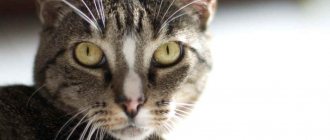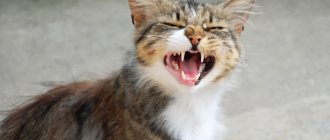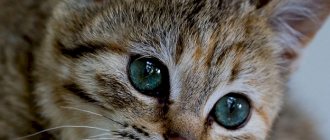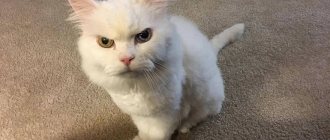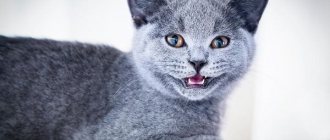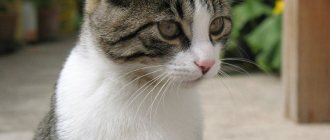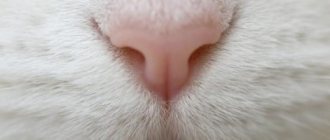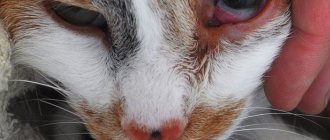A pet's illness is always scary, and it is not known who is more worried - the animal itself or its owner. But not all cat owners notice such a small, at first glance, problem as whisker breakage. Sometimes this is not just a physiological feature, but a signal of internal disorders. It is especially important to establish the reason why a kitten’s whiskers are breaking - the baby has just come into this world, but, quite possibly, something is already wrong with him. However, precaution is also important here - in some cases the whiskers break on their own, and there is no need to take the cat to the veterinarian. The question arises - how to determine when to worry?
Why do cats need whiskers?
All animals from the cat family have good hearing, a sense of smell and a specific organ called whiskers (vibrissae) in the form of coarse hairs near the mouth, which have a pronounced function of touch. The bases of the organ are located on the surface of the skin and are connected to a large number of nerve endings.
Vibrissae transmit special impulses to the brain to receive certain information. Therefore, if you cut off a cat’s whiskers, it may lose important functions for the body:
- orientation in the environment. It is with the help of their whiskers that cats are well oriented in the place where they are, since the whiskers transmit impulses about the presence of possible obstacles. The animal’s brain begins to solve the problem after receiving the appropriate signal;
- moving a cat at night. This function is especially useful for elderly animals whose visual acuity is impaired;
- successful jumping by cats, since with the help of their whiskers the animals accurately calculate the distance, trajectory and angle, the force of the body flight for successful hunting and protection when meeting an enemy;
- normalization of the vestibular apparatus, which ensures the animal’s balance while walking, jumping, running;
- the mustache is an integral assistant during hunting, since the sense of touch helps to establish the direction of the wind, the smell of the prey and its path of movement in complete darkness;
- With the help of their whiskers, cats can determine the depth of various holes. Reflective impulses from the walls transmit a signal to the brain, and the animal can assess the danger of a particular situation for itself;
- cats without whiskers cannot normally determine the temperature of food, liquids and recognize their nutritional characteristics;
You may be interested in: Why do cats purr and how do they do it?
- many experts confirm that with the help of their whiskers, cats can detect magnetic changes in the earth and predict meteorological weather conditions;
- one or another position of the whiskers may indicate the mood of the pet (spaced and raised whiskers indicate a strong interest in the cat, and if they are pressed to the muzzle, then the animal experiences a feeling of fear).
Therefore, if a cat’s whiskers are cut, the animal will lose all of the above functions, which will negatively affect its general condition.
Meaning of mustache
At the base of the cat's whiskers are muscles containing nerve endings. Each of them is connected in a certain way to the brain. At the slightest vibrations of the whiskers (vibrissae), the necessary information is transmitted at the impulse level. Scientists have found that through these hairs, representatives of the cat family have a three-dimensional specific vision of the world around them in the dark.
Table no. The meaning of whiskers and eyebrows for cats
Function
Meaning
How to prevent mustache loss?
To prevent this problem from occurring, you need to:
- Properly feed your four-legged pet. When feeding him with ready-made food, preference should be given to high-quality brands. If he eats natural food, only fresh, protein-rich foods should be used when preparing it.
- Periodically give a pet that eats food prepared independently by the owner, vitamin and mineral complexes, previously agreed upon with a veterinarian.
- Promptly treat the animal for worms and ectoparasites in order to prevent infection with them or get rid of them.
- Take your cat to the veterinarian regularly for a preventive examination.
- Do not delay treatment of diseases detected in your cat.
- When your four-legged pet consumes dry ready-made food, make sure that it consumes enough water.
The role of vibrissae. Vibrissae allow you to accurately determine the size of the hole into which the cat can crawl. If the sensitive “antennas” on the muzzle, thrust into the hole, rest against something hard, the animal immediately retreats.
Sensitive hairs of a slightly different type can be found in murkas:
- inside the ear;
- on the inside of the wrist;
- between the toes;
- on the tail.
Dimensions.
Individuals born with low vision or blind are endowed with particularly prominent vibrissae, exceeding 8 cm in size.
Anatomical structure. The vibrissa has a hair bursa immersed in the thickness of the skin, surrounded by a tangle of capillaries and numerous nerve endings. In the brain, each vibrissa is assigned a specific receptive zone. The summation of signals gives the cat a picture of the tactile sense. It is noteworthy that the sensitive hairs of Maine Coons are anatomically similar to typical hairs, but are longer and coarser.
Expressions of feelings. The whiskers clearly demonstrate the emotions and mood of the pet. An attentive owner will notice that the vibrissae:
- curious or wary cats are directed forward;
- when aggressive, they puff up in different directions;
- in a friendly mood and while purring, they are pressed to their cheeks.
Also watch the video why a cat's whiskers fall out:
What to do to stop breaking and loss of whiskers
Do not self-medicate and contact your veterinarian.
After a clinical examination and tests, the animal will be diagnosed and the correct treatment will be prescribed.
Loss of whiskers is an important symptom that accompanies a variety of diseases, so it is important to determine the exact cause. Typically, therapy includes:
Typically, therapy includes:
- anthelmintics and antiparasitics, which help get rid of parasites;
- antihistamines, eliminating allergic reactions;
- antibiotics that fight infections;
- vitamins and minerals that help restore immunity.
It is equally important to normalize the living conditions of the pet, due to which the whiskers may fall out:
- Eliminate excessive dryness in your room using a humidifier.
- Shorten your baths and change your shampoo.
- Buy fatty acids, biotin and taurine. Strictly follow the dosages prescribed by your doctor. Excessive amounts of vitamins will lead to new problems.
- Eliminate stress factors. Stop negative relationships in the cat community.
- Switch to quality food. Remember that changing feeds occurs gradually by mixing a new option into the old one.
- Keep an eye on your water balance. Use any tricks, but ensure sufficient fluid intake.
A cat that has lost its whiskers is unable to navigate in a dark room and checks the temperature of food with its paw.
Kitten care
Caring for a small creature is an important part of its life. The kitten will require daily care, and now the baby's health is in your hands. Therefore, in addition to regular visits to the veterinarian, conduct a daily self-examination. It only takes a few minutes, but can prevent serious trouble. Remember that in doubtful cases you should immediately contact a veterinarian!
Ears. Gently clean your kitten's ears with a cotton swab. If you notice redness, liquid discharge or scabs, contact your veterinarian. Ear mites are not uncommon in kittens. A thick, black, waxy discharge is a clear signal to contact your veterinarian. It is useful to wipe the visible part of the ears weekly with a moistened cotton ball. Never reach too deep into the ear - kittens' ears are delicate, and if you don't see what you're doing, you could damage them.
Eyes. In a healthy kitten and cat they always shine. Make sure there is no redness around the eyes. Cats' eyes usually don't require much care. Some short-nosed cats, especially Persians, may need to clean the folds under their eyes daily. Let your veterinarian and the breeder who sold the kitten show you what to do.
Mouth. If, after examining your kitten's small mouth, you notice changes in the color of the teeth and gums, these may be signs of periodontal disease.
Wool. Pay attention to dull or matted fur and oily skin. Although your short-haired kitten's hair won't get matted, brush his coat at least once a week, and even more often during shedding season. Brushing will stimulate the animal's skin, distribute hair oil evenly, remove dead hair, teach the kitten to be patient with touch, and give you the opportunity to do a quick and thorough examination of the kitten. Some long-haired kittens have fur that is not too thick or soft (for example, Norwegian Forest Cats and Maine Coons), and the hair rarely tangles. Others, such as Persian kittens, have matted fur, it seems, simply because they are moving. These kittens need daily brushing to look and feel their best.
Paws. Reddened paw pads are not a good sign. To prevent claws from hurting, the kitten should often sharpen them on a special post or scratching post. It is very useful to wipe or wash the kitten's paws after visiting the litter box.
Why does a cat's eyebrows fall out? Other causes of alopecia
In addition to subcutaneous mites, active hair loss in a cat in the eye area can be caused by unhealthy diet, taking certain medications, neoplasms (both benign and malignant), lichen, scabies, and genetic predisposition. A receding hairline appears near the eye and then appears in other parts of the body, most often in the abdomen, hind legs and ears.
The most common allergens that cause bald patches are cereals, sheep meat, and protein of plant and animal origin. If a nutritional (food) allergy is confirmed, then it is necessary to switch the pet to hypoallergenic food and the problem will immediately be eliminated.
shutterstock
Also, in a cat, bald patches near the ears can occur due to psychological disorders, for example, due to severe stress or emotional overstrain. This condition is typical for a cat after moving, a change in climate, when another pet appears in the family (type and age do not matter) or at the birth of a child.
Sometimes hair loss near the eyes occurs in the postpartum period. Most often this is due to exhaustion of the body after giving birth and feeding kittens. In this case, to eliminate bald spots, the cat needs to be provided with adequate nutrition, as well as additionally given multivitamin complexes
It is especially important to have vitamin B1 in such preparations, which normalizes the functioning of the nervous system.
If bald patches in the eye area are the result of hormonal imbalance and pathologies such as hypo- or hyperthyroidism, diabetes mellitus, adrenal hyperfunction, then the cat will experience frequent urination, sudden weight loss, or, conversely, the development of obesity (even though the cat’s diet will remain unchanged) , increased thirst.
Why does a kitten's whiskers break?
Does your kitten's whiskers break? This phenomenon cannot be ignored. Usually it is caused by harmless reasons that do not threaten the health and life of the baby. However, breaking off whiskers in small pets can also be caused by more serious factors that require urgent action. Every cat owner, even those who have never encountered this problem, should know why kittens' antennae break off.
Whiskers chewed by a cat
Broken whiskers on a small cat that has not yet been weaned from its mother may be the work of its paws, or rather teeth. Some cats, teaching kittens to live independently, bite off the babies' whiskers when they do not obey and play a lot of pranks. Maternal instinct tells four-legged mothers that this is the only way to calm their unruly cubs.
According to another version, they do this because they do not want to release the babies into independent life too early. As noted earlier, with the help of vibrissae these animals learn about the world around them. When kittens begin to do this especially actively, cats, wanting to extend the time they stay nearby, chew off their antennae.
There are 2 more possible reasons for cats chewing off the whiskers of kittens:
- for the safety of children who show special zeal in exploring the world around them;
- to highlight a favorite - it is believed that Siamese cats do this.
Curious kid set his mustache on fire
If the kitten's antennae did not fall out or break off, why did they become shorter? He might just set them on fire. Young cats are extremely curious creatures. Unlike adult animals, they are not yet so fearful and do not know how to adequately assess the danger that threatens them.
Their attention can be attracted by anything - from a spool of thread falling on the floor to an open source of fire.
While exploring the kitchen, a curious child may become interested in the dish being prepared on the stove. Approaching him, the baby can easily set his long antennae on fire. If you look closely at them, the reason for the decrease in the length of the whiskers will become obvious.
The kitten is deficient in vitamins and minerals
One of the possible causes of this problem is insufficient intake of vitamins and minerals into the body of a small pet. A deficiency of nutrients is primarily reflected in the appearance of the animal: the condition of its fur deteriorates (it loses its shine and falls out), the claws become brittle and deformed, an unpleasant odor appears from the mouth, and the whiskers break off.
Often, cats suffer from a lack of taurine (this may be due to the rare feeding of the pet with meat) and collagen, which they are not able to obtain on their own. If a small cat's whiskers break off, or the condition of its fur and claws has deteriorated, it is necessary to analyze its diet and, if necessary, replenish the deficiency of nutrients and vitamins. For this purpose, there are vitamin-mineral complexes that must be prescribed by a veterinarian.
Skin diseases are to blame
Various skin lesions, caused by various microorganisms, lead to a deterioration in the condition of the hair follicles. Their blockage as a result leads to the loss of the mustache. Pathogenic agents also attack the structure of the vibrissae, causing them to break. This is not the only symptom of dermatological diseases. These diseases can also be accompanied by redness of the skin, peeling, itching, and suppuration. The exact cause of a kitten's antennae breaking off can only be determined by a veterinarian after carrying out diagnostic procedures.
Parasites and fungi
Fungi negatively affect the structure of a cat's whiskers, leading to their loss and breakage. Often the vibrissae are chewed by lice eaters that have settled in their bulbs. They also break down in these animals due to helminthic infestation. When a cat's body is attacked by parasites, it throws all its strength into fighting them, as a result of which the whiskers become brittle due to a lack of necessary elements.
It will not be possible to improve the condition of the whiskers unless the cause that led to its deterioration is eliminated. Treatment for a small pet depends on which pathogenic agents caused the disease. If the development of the disease is provoked by parasites, therapy involves the use of antiparasitic drugs, fungi - antimycotic drugs.
Metabolic disease
If a small pet's whiskers break, the problem may be caused by a metabolic disorder in its body. Improper metabolism negatively affects not only the functioning of the animal’s internal organs, but also its appearance. Disruption of the process of continuous intake of necessary organic and inorganic compounds into the body from the outside and their absorption leads to a deterioration in the condition of the coat, skin and whiskers, causing their fragility.
Why does a cat's whiskers fall out and is it normal? A cat's whiskers are falling out - causes of loss
There are several reasons why a cat's whiskers fall out. If an animal behaves strangely, bumps into objects or shows anxiety, and the owner notices fallen or broken whiskers, the cause may be a pathological process developing in the body. The most common causes of whisker loss in cats are:
- Acute deficiency of vitamins and minerals in the body. Loss or increased fragility of the vibrissae occurs as a result of a lack of vitamins, especially fat-soluble ones - retinol and ergocalciferol. Fragility may also be caused by a lack of collagen in your pet's diet. In addition to the fragility of the whiskers, there are disturbances in the structure of the coat (dullness, loss), the claws peel off, and an unpleasant, repulsive odor can be heard from the oral cavity. The occurrence of such symptoms requires consultation with a veterinarian and diagnostic measures. It may be enough for your pet to adjust its diet by adding vitamin and mineral complexes to its main food.
- Thyroid gland dysfunction. Problems in the endocrine system always negatively affect the functioning of the entire body. One of these pathologies is hypothyroidism. This is a pathological process caused by decreased activity of the thyroid gland. Most often diagnosed in elderly pets due to a general slowdown in the body's metabolic processes. With hypothyroidism, the animal’s whiskers not only fall out, but seem to crumble. The coat also undergoes changes, the animal shows anxiety, appetite increases, and polydipsia (increased thirst) occurs. The pet may suffer from anorexia. Hypothyroidism can be characterized by dyspeptic disorders - eruption of gastric contents, profuse diarrhea. Self-medication in case of hypothyroidism can cause death of the animal, so it is recommended to consult a qualified doctor. This will allow us to assess the degree of neglect of the pathology, as well as develop an adequate treatment regimen.
- Pathologies of the skin. Skin diseases that arise as a result of fungal pathologies or the activity of pathogenic bacterial microflora, especially in the area of the pet's face, also provoke whisker breakage. Vibrissae can fall out in a cat if it is affected by notoedrosis or microsporia. This is due to the fact that the cat’s whisker follicle is located deeper than the hair follicle. In addition to the loss of whiskers due to a fungal or bacterial skin infection, symptoms such as itching and restlessness are observed. As a result of scratching the skin, wound surfaces are formed.
- Food allergic reaction. A food allergy in a cat provokes disruption of the internal organs. The skin and coat are primarily affected. Whiskers and hair fall out in the head area, with further scratching and the formation of crusts. It is necessary to eliminate the factor that provokes the allergy. A veterinary specialist will help carry out differential diagnosis and give recommendations for treatment.
- Injuries resulting from fights with relatives. Domestic cats constantly defend territorial boundaries. Therefore, fights between relatives occur quite often. In order to cause inconvenience to its opponent and show its superiority, the cat rips out the enemy's whiskers by the roots or bites them. If fights occur between two cats living in the same house, it is recommended to separate them, carefully monitoring the fights. Pets that do not have breeding value are recommended to be neutered.
Normal for mustache loss
If a cat's whiskers fall out, this is not a reason to panic. First of all, you need to take a closer look at its behavior and see if a new whisker grows in place of the fallen whisker.
Most often, mustache loss is not associated with any abnormalities. Regardless of the molting period, they can be periodically renewed - old vibrissae fall out, and new ones appear in their place. The reason why a cat's whiskers fall out can be a fight with another animal or excessive curiosity, in which he comes too close to a burning fire.
How to help an animal that has lost its whiskers
Regular whisker loss in cats without an identified cause requires additional examination by a veterinarian. After receiving the results, appropriate treatment methods can be carried out:
- taking anthelmintic and antiparasitic drugs for therapeutic and preventive purposes;
- antihistamines to eliminate allergies and antibiotics to treat infectious diseases;
- vitamins, minerals to strengthen and restore immunity.
Creating favorable living conditions for your pet:
- eliminating excessive dryness in the room when using a humidifier;
- ensuring that bathing is not too frequent and using special shampoos;
- the use of fatty acids (biotin, taurine) in compliance with the dosages prescribed by the veterinarian, since an excess amount of drugs can have the opposite effect;
- eliminating stress factors for your pet;
- use of high-quality animal feed;
- ensuring water balance (regular fluid intake by the cat throughout the day).
Recommendations for eliminating this problem if your cat’s whiskers fall out for various reasons:
- using cheap food for the animal, since such products are of poor quality and can negatively affect the general condition of the pet;
- regular treatment of the coat against parasites, fleas and ticks;
- processing raw meat to destroy helminth eggs that may be contained in it;
- excluding aggression towards the cat from other family members (young children);
- addition of various vitamin complexes to the daily diet of cats;
- regularly providing the required amount of drinking water for the animal, since its lack contributes to the development of urolithiasis and other problems;
- visit the veterinarian at least 2 times a year to assess the general condition of the pet;
- excluding the trimming of whiskers in cats, since even a slight shortening of the length can cause the development of negative consequences.
Whiskers for cats are one of the important organs that provide touch, so their damage becomes the cause of many disorders in the body. Vibrissae require careful care and control on the part of the pet owner to maintain the good condition of the animal.
What to do if an animal’s whiskers begin to fall out
Having noticed a similar problem, every inexperienced owner wonders why the cat’s whiskers are falling out, what to do and how to help her. When hair loss is rare and temporary, there is nothing to worry about. Frequent and abundant loss and fragility of the whiskers is a reason for an early visit to the veterinarian.
Ignoring the problem can lead to serious complications during the development of certain diseases. Therefore, after making an accurate diagnosis, treatment should be started immediately in order to save your pet not only and not so much from whisker loss - sometimes even from death.
If during the examination and conversation it is revealed that the cause of the loss of whiskers was an incorrect feeding system, a veterinarian will help you adjust a new balanced diet.
The whiskers returning to their previous shape will be living evidence that restorative changes are taking place in the cat’s body.
Prevention of vibrissae loss
To ensure that your cat always maintains its beautiful and healthy whiskers, you need to follow some simple rules:
the animal must be treated in a timely manner for worms and parasites using special means; feeding the pet must be carried out in accordance with the recommendations of veterinarians; it is necessary to pay attention to the signs that indicate an allergy and promptly eliminate the factors that cause it; you cannot neglect the schedule of scheduled vaccinations and skip them; it is necessary to visit a doctor at regular intervals;
You can’t trim an animal’s whiskers; you shouldn’t even just pull them. These actions cause discomfort and contribute to the loss of whiskers. To preserve the richness of your cat's whiskers, you should:
- Feed your cat high-quality food. Cheap food will not bring any benefit and will destroy the animal’s immune system.
- Include additional vitamin and mineral complexes in the diet if the cat is on a natural diet.
- Animals on a natural diet need additional vitamin and mineral complexes, but the drug itself must be prescribed by a veterinarian
- Monitor the amount of water consumed by a pet fed with dry food.
- Before offering your cat raw meat or fish, heat the food or freeze it for 2-3 days to avoid infection with parasites.
A cat's whiskers are a significant organ, and its condition must be monitored. If you follow the recommendations of specialists and avoid the causes that cause the loss of whiskers, your pet will lead a full life for many years.
How can the owner help the pet?
If your pet has severely lost its whiskers, it is necessary to carefully examine it. Itching and skin diseases provoke hair loss and peeling of the epidermis in the sore spot. The animal can be especially bothered by head itching - as a result of constant washing and rubbing, the muzzle and whiskers will break off.
Itching is caused not only by food allergies, but also by atopic dermatitis, parasitic disease or lichen. The latter is extremely unpleasant due to its contagiousness, including to humans.
If focal baldness is detected, it is necessary to contact a specialist at the clinic. What else needs to be done?
Firstly, the owner is obliged to establish what exactly the problem with the loss of the mustache is. Do the living conditions correspond to the normal existence of the animal - does the cat drink too little water, does it bathe often, is the air humid enough, what kind of food and shampoo is used. Preventive measures for deworming and eliminating parasites are carried out at least once every 4-6 months. With a cat, a visit to the clinic is necessary in case the pet is infected with a fungal infection or has a chronic disease. Be sure to review your diet and add foods rich in vitamins, minerals and healthy fatty acids. It is better to raise babies on natural food. If possible, buy holistic foods and premium food.
Diseases that can make your mustache stubborn
One of the reasons leading to the loss of whiskers is that the kitten does not eat and drink properly. Seeing that a four-legged friend refuses water or, on the contrary, begins to drink a lot and often, the owner of the game should be wary and think about a visit to the doctor. The fact that the mustache is broken off is not the cause of the disease, but one of the symptoms.
It’s truly the same with nutrition - if the diet is poorly balanced, because the whiskers cease to be elastic and break as soon as the kitten awkwardly jumps or falls. There are different cases when nutritional imbalance may sound:
- Artificial products.
Although they write on the food products that they contain useful minerals and essential vitamins, in fact they are often made from useless products for cats. Especially if these are cheap products. Occasionally, an animal simply cannot tolerate one or another pinworm. And the most dangerous thing is the fact that dyes and other additives with chemical components are added to the feed. This not only harms the whiskers, but also the cat’s body in general. - Natural products.
In this case, the preposition most often occurs in the surrogate components from which the product is made. It is not always possible to know with certainty what the dog meat was processed with, what exactly the cottage cheese was made from, and it is not known whether chemicals were added to the return. The cat's body, by its nature, is very sensitive to such components and it is likely that because of them the kitten began to lose its whiskers. - Food intolerance.
The kitten suffers from allergic reactions to any product, and not only does it lose hair and whiskers, but it also sheds tears, itches the skin and has signs of dermatitis. - Vitamin deficiency.
The animal simply lacks the necessary vitamins, which leads to damage to the mustache. - Hormonal system disorders.
In cats, the functioning of the thyroid gland can often be determined by their whiskers. Quite often hypothyroidism manifests itself - depression or hyperthyroidism - a very large intensification. Signs include too much or too little weight, thinning fur, hair loss (and whiskers too). Seeing this, you can at least understand that the young animal has problems with the thyroid gland.
What are the consequences of losing a cat's whiskers?
The loss of whiskers in these animals can be equated to the loss of hearing or vision in humans. A cat without a mustache becomes helpless. She is deprived of the ability to navigate in space, move in the dark, sense approaching danger, or determine the temperature of food. The loss of a mustache, if it was not caused by pathological factors, is rather a psychological problem. This does not affect the cat's health in any way. Nothing threatens your pet in the home; he can determine the temperature of food with his paw, and use his vision to orient himself in space.
The only danger that threatens an animal that has lost its whiskers is injury during a jump from an object, the distance to which it could only determine with the help of its whiskers.
The loss of whiskers is a serious problem for outdoor representatives of this family, which exist in dangerous conditions in which their whiskers help them survive.
Why you can't trim your mustache and eyebrows
Trimming a cat's whiskers and eyebrows is strictly contraindicated. This makes their existence very difficult. Vibrissae are one of the main organs of the cat family and serve as tactile and olfactory receptors. In some animals, the hairs may fall off on their own for a variety of reasons, but then they grow back. However, specially cut hairs cause significant discomfort to the pet.
Cats should not have their hair cut because it will negatively affect their health. The pet will not lose its sense of touch or smell, but spatial orientation will deteriorate significantly. Instead of lost or cut whiskers, new ones will grow in the cat only after 3 months. This is a very long period of time, so cats should not have their whiskers trimmed.
Damaged whiskers deprive the cat of adequate perception of the surrounding world
What problems will a cat have to face if its whiskers are trimmed?
- there is a decrease in jumping ability as a result of a deterioration in the computational function, the pet jumps or does not jump to the desired goal;
- there is a loss of the ability to accurately measure objects or distances, the cat may suddenly get stuck or fall;
- changes in behavior are observed, the animal becomes inactive, timid, and sometimes aggressive;
- the risks of injury increase, for example, a cat may lose an eye or injure its skin without noticing the threat in time due to the lack of whiskers;
- a certain disorientation develops, due to which the animal is often injured at night, gets hit by cars, and is unable to escape from the dog in time.
In most cases, while the cat's cut hairs grow back, she leads a recumbent lifestyle and loses her appetite. As a result, the fur becomes faded and loses its color. The pet stops catching mice, does not react to birds and live fish, and begins to go to the toilet in the wrong places.
What to do if a cat or kitten loses its whiskers
If the owner of a cat or kitten notices the loss of his pet’s whiskers, it is necessary to pay attention to his general condition and behavior. In adult cats, the intensity of whisker loss should be noted.
Before a diagnosis is made, the doctor must conduct a series of studies and obtain the results. Based on them, a conclusion is drawn and treatment is prescribed:
- When a cat loses its whiskers as a result of an unbalanced diet, it will be prescribed dietary nutrition. It may contain an additional vitamin and mineral complex or exclude those foods that cause allergies.
- If a disorder of the endocrine system is detected, the cat is prescribed appropriate treatment along with a change in diet.
- If a fungal or helminth infection is detected, treatment is prescribed to eliminate it.
Main reasons
Each of the mustaches is an independent organ of touch, transmitting information to the cerebral cortex. In the process of their vibration, as well as from contact with objects, the animal receives information about their location, ambient temperature, and also about its position. Therefore, if a kitten’s whiskers break off, it becomes defenseless in front of the outside world.
Why did the cat's whiskers break off?
Adult animals are characterized by partial replacement of whiskers, when old ones fall out and new ones grow in their place.
If the cat notices active loss of whiskers or they visually become smaller, the owner should pay attention and find a possible cause. Such a symptom can either have a trivial cause or indicate serious health problems.
External factors for mustache loss include:
- Low air humidity. This problem occurs during the heating period.
- Frequent bathing of the animal, as well as the use of poor quality shampoos.
- Hormonal imbalances in adolescence.
- Lack of water. Refusal to drink or excessive absorption of liquid is a reason to consult a veterinarian. Loss of antennae in this case is a harmless symptom of dangerous diseases.
Cat's lost whiskers
Internal factors include the following:
- Poor nutrition. At the same time, whiskers can fall off both with natural nutrition and with feeding with industrial compounds. In the first case, the cause is surrogate products, as well as meat undergoing chemical processing. In the second case, cheap food, consisting of large amounts of beans, dyes, chemical salts and other dangerous substances, is most often to blame.
- Allergy. If you have an individual intolerance to certain components, the coat may deteriorate, the claws may peel off, and the mustache may fall out and break off. Redness of the eyes and development of dermatitis are also possible.
- Lack of vitamins. The development of vitamin deficiency is reflected in the quality of coat, eyebrows and mustache. If an animal does not receive the required amount of microelements and vitamins from food, it is necessary to additionally introduce vitamin supplements into the diet.
- Lack of microelements. Often the mustache can break due to a lack of potassium, magnesium, phosphorus and calcium. All these elements are useful in combination, otherwise mustache loss is a possible minimum. The main reason may be the development of urolithiasis and hypocalcemia.
- Hormonal disorders. Too much or too little hormones can lead to a variety of problems. But first of all, the fur and whiskers suffer. Overweight is common.
- Presence of parasites. Fleas and ticks can lead to allergic reactions, as well as a decrease in the cat's immunity, which negatively affects the condition of the coat and whiskers. Whip eaters are able to gnaw the vibrissae at their base.
- Fungal diseases. Under the influence of the fungus, the hair follicles become clogged, crusts and growths form on the skin. Vibrissae may grow into the skin or not grow at all.
It is important to strictly adhere to the dosage of vitamin complexes, since an excess of vitamins is no less harmful than their deficiency
Loss of whiskers in a kitten
The answer to why kittens' whiskers break off most often lies in age-related changes. After falling out, young thin vibrissae are replaced by thick adult ones.
Lice eaters in cats.
However, a kitten’s teeth do not always break for this reason; there are also psychological factors:
- Animals can break off each other's whiskers, thus showing their superiority.
- A mother cat may chew off the whiskers of an older kitten if they are not separated for a long time.
- Sometimes children can burn or cut off the whiskers. It is necessary to explain how to behave with an animal from childhood.
Depending on the breed
If it is not clear why the kitten's whiskers broke off, you should take into account its breed. So some cats, by their nature, have a greater tendency to lose or even have no whiskers. This applies to all sphinxes: Don, Petersburg, Canadian, and their hybrids: Elves, Bambino and others.
Appearance of the vibrissae of the Sphinx
Other breeds are characterized by long and bushy mustaches. For example, in Maine Coons they grow up to 20 cm in length. In breeds with curly hair, like German Rexes and others, the whiskers are curled and quite thick.
Important! Whatever the vibrissae are, they cannot be cut, broken, or removed - this will not only cause pain to the animal, but will also lead to severe stress for a long time
What can be done about this problem?
What should you do if your cat’s whiskers begin to fall out and break? The universal answer is this: the first and most important thing an owner can do for their pet is to calm down, pick up the animal and take it to the veterinarian. Under no circumstances should you try to cure this problem yourself, because most often mustache loss is a symptom, not a disease . In general, no special actions can be taken in this case - you should not comb your mustache or lubricate it with any oil, you just need to find the cause of this problem and eliminate it.
We had a cat who constantly set his eyebrows and mustache on fire by jumping onto the table next to the stove. so he went as a hussar. So ours decided to jump straight onto the stove now:001:, when we bought a new one. The old one didn’t interest her at all, and I don’t understand what and how I can do to make her lose interest in this one. I’m keeping an eye on them, but today they were in charge without me :wife: :)) Although cats are such swift and capricious creatures that it’s no wonder they can’t keep track. We can only hope for their intelligence :ded:
